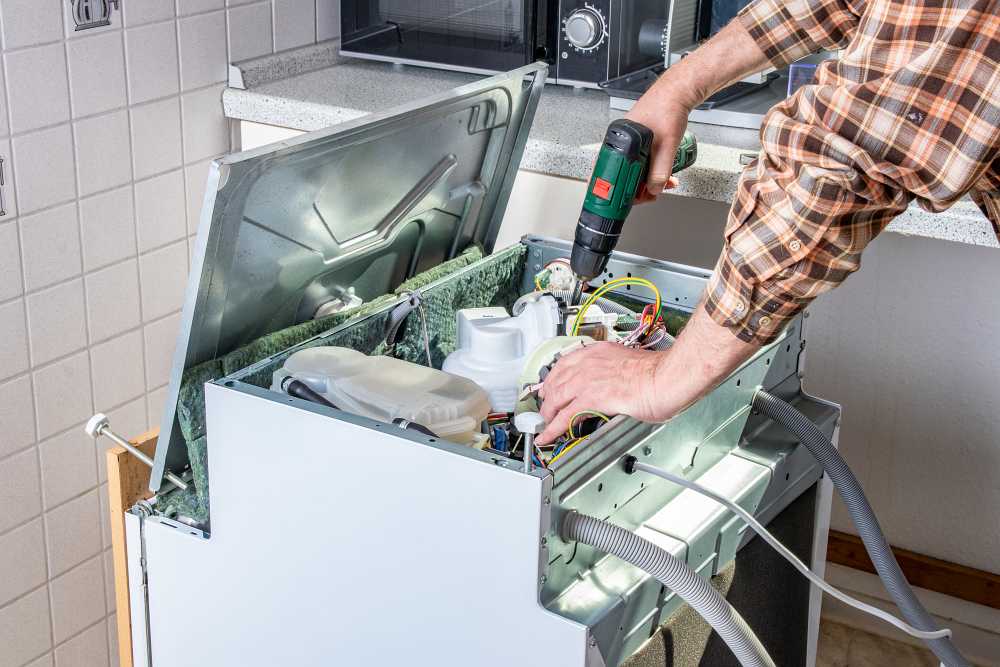Your fridge is on the fritz. Your disposal is disabled. Or your washer sounds like it’s washed up.
You’re thinking, should I repair or replace my appliance? Here are a few things to think about as you make your decision.
Know the lifespan of your appliances.
There are lots of things to consider, but let’s start with how old the machine is. Generally speaking, if you’re careful in how you use them, you can expect your major appliances to last from 10 to 15 years.
- You should be able to count on your clothes washer and your dishwasher to clean up for a decade or longer.
- Your refrigerator should keep your food cold and your dryer should have your clothes coming out dry for around 13 years.
- Your range should keep cooking for a few years longer than that.
Of course, you may be tempted to replace one or more of your appliances while it’s still in good condition in order to take advantage of the greater energy efficiency and other advances.
Compare the cost of replacing vs. repairing appliances.
How much you pay to fix your machine depends on what’s wrong with it. If it’s more than halfway through its expected lifespan, and the repair estimate is around half the price of a new appliance, it might be time to start shopping for a new one. Otherwise, you’re probably better off repairing it than spending upwards of $2,000 for a new appliance. Of course, a broken-down washing machine is a good excuse to swap it out for that sleek, high-tech model that’s loaded with bells and whistles.
Sometimes, age is just a number.
There are other things to consider besides the age of the appliance and the cost of replacing it. For one, you may be able to extend the life of your machines through simple maintenance—like keeping them clean inside and out, replacing filters, vacuuming refrigerator condenser coils, and keeping vents clear. Then there’s your tolerance for the potential disruption of replacing, say a built-in range.
Speaking of potential, you could save around 20 percent on the cost of running that washing machine or refrigerator by replacing it with a more energy-efficient one. And depending on your devotion to style, you may want to replace all your kitchen appliances at once so they create a uniform look. On the other hand, if you’re thinking about moving in the near future, save your money and let the next owners pay to upgrade to energy-efficient models.
Is that refrigerator really ready to RIP?
When one of your older appliances starts giving you trouble, your first thought may be to go ahead and buy a new one. But there are a few things you should do before you run out to the big-box store. First, make sure the machine is plugged in. Hey, you never know. Check to see if the circuit breaker’s been tripped. It’s a lot easier to flip a switch than replace a dishwasher. Make sure any vents and filters aren’t clogged. You should even see if the floor underneath is level. And check to make sure the machine is still under a manufacturer's warranty. If it is, go ahead and set up a service call. 
Are you prepared to DIY?
If your appliance’s warranty has expired but you’re not ready to buy a new machine, it might be worth asking yourself whether you might be able to fix the problem yourself. There’s no shortage of how-to videos to check out online, and there’s always the chance that your owner’s manual can help you pinpoint and solve the issue. But there are a few things to keep in mind. For instance, are you comfortable with maneuvering heavy appliances in tight spaces? Is the warranty voided if you tinker with the machine yourself? Will you be able to return any replacement parts that you buy by mistake?
It's energy-efficient. But is it cost-effective?
Here’s something else to think about when you’re mulling the replacing vs. repairing appliances conundrum. A new fridge uses about one-third less energy than an older model. But is that a good reason to swap out your otherwise functional appliance? Is spending thousands of dollars to save hundreds on electricity really a good idea? Of course, if you care more about reducing your personal carbon footprint than saving money, that’s a whole different ball game.
Some replacement costs you might not have thought of.
The cost of replacing a fridge, stove, washer, or dryer may include more than just the price of the machine. In fact, that could be the least of the money you’ll spend on an upgrade. You may have to re-configure your kitchen cabinets to accommodate a new refrigerator, oven, or dishwasher. Switching from an electric to a gas oven and range makes sense if you’re already hooked up to gas. Otherwise, you could be talking thousands of dollars to tap into that energy source. And stepping up from a simple gas range to one with the latest features could mean adding wiring and circuits.
Breathe easier with the Frontdoor app.
Frontdoor takes pride in helping savvy homeowners find practical solutions. Breathe easier knowing that with just a few taps of your phone, you can video chat with a highly skilled Expert.
The Frontdoor app provides you with hassle-free expertise and guidance to make dealing with breakdowns easy. Download the app if you haven’t already, and chat with a helpful, friendly Frontdoor Expert.
Frontdoor assumes no responsibility, and specifically disclaims all liability, for your use of any and all information contained herein.
Was this article helpful?





